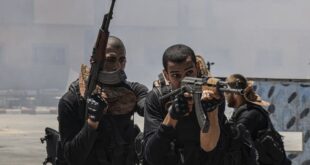GAZA CITY (AFP) — Palestinian President Mahmoud Abbas declared a state of emergency and sacked the government on Thursday as Hamas appeared set to seize full control of the Gaza Strip after days of ferocious gunbattles.Gaza was on the brink of civil war as Hamas fighters overran all security strongholds of Abbas’ Fateh faction across the territory, where at least 113 people have been killed in an explosion of bloodshed in less than a week.
Abbas announced the dismissal of the three-month-old government and Hamas Prime Minister Ismail Haniyeh and proclaimed a state of emergency in Gaza and the occupied West Bank over what he called a “military coup”.
In a decree read by his presidential secretary general, Abbas said his action was “because of the criminal war in the Gaza Strip, the taking over of the security services of the Palestinian Authority, the military coup and the armed rebellion by outlaws”. But Hamas immediately dismissed the declaration as “practically worthless” and later announced it was in control of all Fateh-linked security bases in Gaza except for Abbas’ seafront presidential compound.
Abbas’ announcement ends three months of fractious power-sharing between his secular Fateh Party and the rival Islamist Hamas, locked for months in a deadly feud that has seen more than 260 people killed since December.
Abbas also appointed an emergency Cabinet and will call for new elections “as soon the situation allows”, Abdelrahim said.
Under the Palestinian basic law, the emergency government does not require approval from the parliament which has been dominated by Hamas since January 2006, when it routed long-dominant Fateh in polls.
The international community voiced increasing alarm about the situation in Gaza, where fighting was raging around Abbas’ compound, the last Fateh redoubt after Hamas fighters stormed Fateh bases across the territory.
The clashes damaged power lines, plunging into darkness chunks of the impoverished territory where many of the estimated 1.4 million residents have been cowering inside for days.
“What is happening in Gaza is the second liberation of the Gaza Strip from the band of [Israeli] collaborators after the first liberation from the bands of settlers” in 2005, Hamas spokesman Sami Abu Zuhri told AFP.
In the deadliest showdown, Hamas gunmen stormed the preventive security force compound in Gaza City and hoisted the Islamist movement’s green flag on the roof after an hours-long battle that left at least 14 dead and 70 wounded.
Fateh fighters loyal to Abbas, some stripped to their underwear, were dragged out of the building with their hands in the air as black-clad masked Hamas gunmen stood watch.
Islamist fighters prayed on the sidewalk while on the rooftop others fired rounds into the air to celebrate their latest victory in what one Hamas leader described as “a battle between Islam and heresy”.
The action by Hamas — considered a terror outfit by the EU, Israel and the United States — could see it in full control of Gaza while the West Bank remains a Fateh stronghold, further complicating Palestinian aspirations for an independent state.
Hamas’ armed wing claimed to have executed a leader of the Fateh-linked Aqsa Martyrs’ Brigades, amid unconfirmed reports of other killings of Fateh loyalists.
A bomb also ripped through the studio of the official Voice of Palestine Radio close to Fateh, forcing it off the air, in an attack blamed on Hamas.
The latest violence flared despite another attempt by Egyptian mediators to secure a ceasefire which appeared to have been agreed by political leaders but ignored by fighters on the ground.
Abbas, who has warned of civil war if the Gaza “madness” continued, cancelled a planned visit to France because of the violence.
The international community warned that the no-holds-barred power struggle endangered prospects of a future Palestinian state and peace with Israel.
US President George W. Bush was “profoundly concerned” and called for a halt to the clashes, while US Secretary of State Condoleezza Rice called Abbas to voice Washington’s “full support”.
Britain expressed regret at the dissolution of the Cabinet, saying “once again extremists carrying guns have prevented progress against the wishes of the majority who seek a peaceful two-state solution”. For a second day in a row, the struggle spilled over into the West Bank, with offices of Hamas-affiliated officials torched and several dozen of the group’s leaders and politicians arrested.
Human Rights Watch has accused both sides of committing war crimes during the fighting, which has turned hospitals into battlegrounds, seen ambulances prevented from reaching wounded and peace demonstrators shot dead.
The violence has forced the main UN Palestinian refugee agency to suspend all but essential activities and the European Union to halt its relief projects in the territory where the majority of people receive aid.
The Arab League called for an immediate halt to the violence ahead of an emergency meeting on the crisis Friday.
UN chief Ban Ki-moon held preliminary talks on the idea of sending an international force to Gaza, but Hamas rejected the move, saying it would treat foreign troops as occupation forces.
Israel — which pulled its troops and settlers from Gaza in 2005 — has watched with increasing alarm, but said it would not intervene.
Tensions have been boiling ever since Hamas routed long-dominant Fateh in the January 2006 poll, often fanned by disagreement over who should control the security services in one of the most densely populated areas of the planet.
 Eurasia Press & News
Eurasia Press & News
